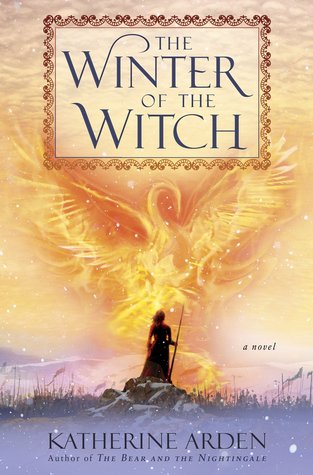
Katherine Arden is on this year's Campbell Award ballot for Best New Writer, so I checked out this book to reacquaint myself with her writing. In the process, I discovered one helluva good book which will definitely make my Hugo longlist for 2019, and possibly my shortlist as well.
This book is a heady stew of Russian history, myth and folktales. In an Author's Note, she reveals that the broad outlines of the final battle in this book actually occurred in history, at the Battle of Kulikovo in 1380. This sort of real-world historical grounding gives the narrative an edge that sets it apart from most fantasy. Unlike some war stories, the author does not concentrate on battle minutiae (there is some of that, but only to the extent necessary to set the stage and emphasize the importance of this battle), focusing instead on her characters and relationships. Plot threads woven in the previous two books come to a head in this one, and everything is resolved in a most satisfactory manner.
I particularly enjoyed the way the main character, Vasya, steps up and takes firm hold of her narrative, and shapes her own story. She's not a kick-ass heroine in the way that term is used nowadays--she doesn't swing a sword (though she is fairly adept with a knife) or have mad martial arts skills. She is, however, determined, stubborn, and persistent, and once she decides on a course of action she will carry it through, come hell or high water. In this book, she's aided by her family and friends, the latter being the people (humans and non-humans) she collects along the way. She is not a Mary Sue type; she is flawed, and as she says in the book, she has done good and she has done evil. But she is an inspiring character, and throughout the book she inspires the people around her to rally to her cause and see it through to the end, no matter the odds against them.
She's aided in this by two characters out of Russian legend: Morozko the frost-demon and Medved the Bear, the chaos-spirit. Both are complex characters (Morozko and Vasya become lovers in this book, in one of the best-written sex scenes I've read recently), and while Medved is pretty nasty in the first two-thirds of the book, when Vasya unbinds him to fight by her peoples' side in the final battle, the reader understands exactly why she does it. The book ends on not quite a triumphant note, but a bittersweet one: the reader can easily picture these three characters fading into the background, keeping the Russian folk demons alive and safe in their various magical realms, and being ready to step up at any time if they are threatened.
(The Russian firebird, masquerading here as a golden mare, figures prominently in this book, with an eccentric, cranky characterization that delights. Vasya's own magical horse, Solovey, is killed early on, but resurrected at the end of the book in a scene that will bring tears to your eyes.)
This is a fine book in its own right, not just as the conclusion to the Winternight Trilogy. I suppose the only drawback is that the reader's appreciation of this book does depend somewhat on your having read the previous two. However, this is a pleasure in itself; you can see that Arden's writing has matured beautifully, and she tells her story with an assured hand. Your appreciation of this book will deepen after having read the first two, but nevertheless, don't pass this one up.

No comments:
Post a Comment